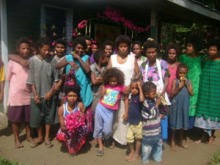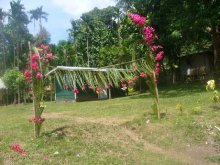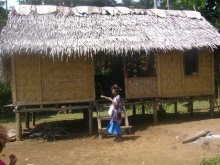| |
|
 |
Bahá’ís in PNG improve their villages' health and education
November 16, 2007:
 |
 |
 |
The Bahá’í mothers of Mom Village, Papua New Guinea, standing in front of their newly built medical aid post. |
Communities of Baha’i believers in Papua New Guinea are transforming their local communities, addressing health, education and environment issues.
Mom Village Medical CentreInspired by the teachings of the Bahá’í Faith on women’s equality and community participation, a circle of mothers in Mom Village on Karkar Island, some 30 kilometres off PNG’s northern coast have funded and built their own medical aid station, which now serves the entire community.
 |
| Inspired by the teachings of the Bahá’í Faith on women's equality and community participation, a circle of mothers in Mom Village on Karkar Island have begun taking their destiny into their own hands. |
|
 |
 |
“The Bahá’ís of Mom Village decided to arise and do something for their community because the government infrastructures like medical aid posts, schools and roads have deteriorated or have been completely closed due to lack of funds for maintenance,” said Abegul Bodick, a frequent visitor to the island.
The project was initiated in 2002 when the villagers launched a fund-raising campaign, which raised 3,048 PNG Kina, (more than US$ 1,000) and resulted in the dedication of a new aid post last year.
Home to about 50,000 people, Karkar Island has few of the services available on the mainland. Residents have to walk long distances to collect water, and electricity is a luxury that typically comes only from expensive solar panels or gasoline-powered generators.
Medical services are also scarce. Although Mom Village is the third largest town on the island, with about 3,500 residents, they previously had to travel more than 10 km to reach the nearest aid station before the new post was built.
 |
 |
 |
The foot path leading up to the recently completed medical aid post in Mom Village. |
“Bahá’í teachings brought new values,” said Mr. Bodick, explaining that the women realised they could now be part of the decision making process denied to them in the past. “The Bahá’í women put forward ideas of fund raising by way of ‘bring and buy,’ as well as a practice known as ‘exchange basket,’ meaning that they would ask the women from other villages to come with a certain amount of money and other gifts while the women in Mom provide the feast,” said Mr. Bodick. “This is a common reciprocal activity throughout Papua New Guinea.”
A new school in BunisiMeanwhile in another remote village - this time in the east of the country - a Baha'i community has opened a primary school that means that children don't have to spend four hours a day walking to school down and up a mountain.
In the village of Bunisi the age you start school doesn't depend on how old you are - it depends on whether you can handle the hike to and from class. Each morning, children trek for two hours, walking some 700 metres down the mountain to their primary School. And each afternoon, they return.
"By the time the children get to school they are exhausted," said Jalal Mills, one of several hundred Baha'is in the area. "Then they are expected to concentrate."
 |
 |
 |
A typical home in Mom Village on Karkar Island, Papua New Guinea. |
But this school term, thanks to the local Baha’i community, the Bunisi Elementary School has added new classrooms. It now extends to the second grade, with pupils coming in from around ten villages.
The land was donated by the chief. "Before, I used this land to hunt cuscus, and now I give it for the future generations to hunt for education," he said at the inauguration ceremony for the new classrooms.
The hope is to expand by a grade each year. Instruction is in the local language, and students pay the equivalent of US$3 a term with public subsidies paying another US$99.
The school has three teachers, and 75 pupils. Two teachers are Baha'is, but most of the students are not.
Even for Papua New Guinea, Bunisi is remote. Located 4,600 feet above sea level near the Milne Bay area in the eastern part of the country, Bunisi doesn't appear on most maps. Most people are subsistence farmers and the closest settlement with electricity and running water is two days walk away.
LinksThese articles were taken from One Country, the online newsletter of the Bahá’í international community.
Link here for full story about the Mom Village and here for the full story about the Bunisi school.
Additional Bahá’í links:
Link here for the Bahá’í World News Service.
Link here to learn more about the Bahá’í faith.
|
 |
 |
|
|
|
|
|
 |
What do Baha’is believe?
The basic beliefs of the Baha’i faith |
 |
Aid to rural women in Central India
The Barli Development Institute for Rural Women, inspired by Bahá’í social activism, gives indigenous women social and environmental training |
 |
ARC and the Faiths
Faith communities are working in countless ways to care for the environment. This section outlines the basics of each faith’s history, beliefs and teachings on ecology. |
 |
 |
|
|

